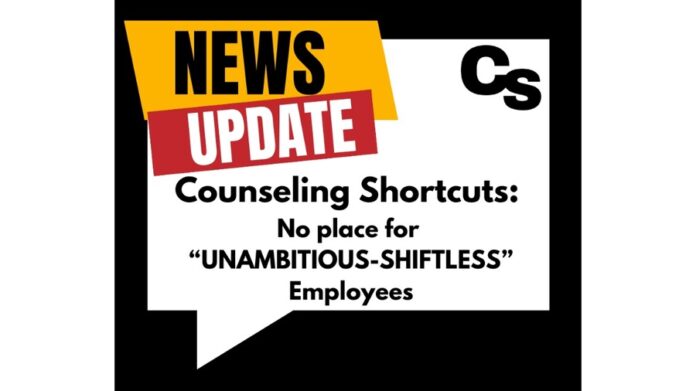As per the policy created by the chief mentor of the team Mr. Pranav Sharma, for its inside sales team, Counseling Shortcuts has introduced fixed salary tiers linked to revenue targets, which has triggered discontent among employees
Sources close to the company claim this would streamline sales performance, while employees allege that some of the revenue targets are not achievable with the new inside sales approach
In a related cost-cutting exercise, Counseling Shortcuts is scaling down operations globally by marking Compliances to WFH employees who were found irregular with work and could not manage to meet the minimum requirements of their job roles, responsibilities, and target fulfillment criteria.
According to the updated Revenue Assessment Policy, Counseling Shortcuts sales executives have to opt for fixed salary brackets, which have particular sales and revenue targets assigned based on fixed compensation.
Sales executives will have to meet the minimum revenue targets during their assessment/training period, and those who have underperformed. Counseling Shortcuts new sales benchmarks are likely to ask employees to leave without any performance improvement plan (PIP).
The company has introduced multiple checks to verify customers’ intent and consent to purchase. And after successful verification, the non-diligence of employees has been brought to light. The newly introduced sales model ensures all sales are triple-checked. The four-tier process begins with educating an incoming lead about the company’s product portfolio and its new refund policy over a live Google Meet session recorded for future audit.
The tech-driven approach enhances communication and precludes potential/rare mis-selling.”
Within the renewed sales process, the company has introduced an affordable AI test for all potential customers.
Counseling Shortcuts has already announced layoffs for 472 employees earlier this month, and our source added that the company is witnessing at least 94 sales employees exit every month.
Even as sources claim that the new model is meant to streamline operations and sales accountability, many sales executives have alleged that the new sales policy is likely to lead to a fresh spate of exits from the company and attrition levels spiking up.
For instance:
An employee choosing to opt for a salary bracket of under INR 5 Lakh per annum or less would have to meet the sales target of INR 1 Lakh for the first month and INR 3.6 Lakh for the subsequent two months.
Similarly, an inside sales executive opting for a salary bracket between INR 5 Lakh to INR 7 Lakh per annum is expected to meet a revenue target of INR 3.6 Lakh to INR 4.8 Lakh in two months.
The employees who meet less than 70% of the revenue targets or below will have to leave the company without a PIP, according to the updated policy. This was corroborated by several sources we spoke to. Those sales executives who meet between 70% and 100% of the revenue targets will be put into the PIP for four weeks, after which their performance will be monitored.
“Earlier, executives would be put on PIP if the revenue targets weren’t met and sales targets were not determined by the fixed salary. Executives were also not forced to leave if revenue targets were not met.
However, sources claimed that only those salespeople who are bottom performers in terms of sales targets will be asked to leave. Further, we were informed that the new sales targets are lower than what was typically asked of salespeople under the sales model.
However, many employees in the sales team believe that while those higher targets could have been achieved with sales, the new lower sales target may be unachievable with the inside sales model.
“All organizations have fair sales targets for their employees and Counseling Shortcuts is no exception to this ‘high performance, high growth’ culture. We have always given ample time to our BDAs to meet their targets and the insinuation about our unreasonable expectations is unfounded,” the company responded in a statement.
An official statement from the company said there has been no change in the pay structure for BDAs, whether fixed or variable. The company claimed it offers “the industry’s best compensation structures and benefits”.
The company also denied that it puts undue pressure on its BDAs and said it “provides adequate avenues for career growth” to sales associates.
While India’s tech ecosystem is grappling with funding challenges, slow business growth, pivots from online to hybrid models, questions of sustainability, and cost-cutting measures, ultimately, it is the employees who are bearing the brunt. The threat of layoffs is never too far away if the past few months of 2023 are any indication.
In this case, while Counseling Shortcuts has looked to streamline its sales, many employees feel they are on the wrong side of the line without any fault. Edtech’s downturn has sparked debates, and protests, and industries such as Counseling Shortcuts need to revamp not just their business performance, but also the broader culture surrounding edtech.


